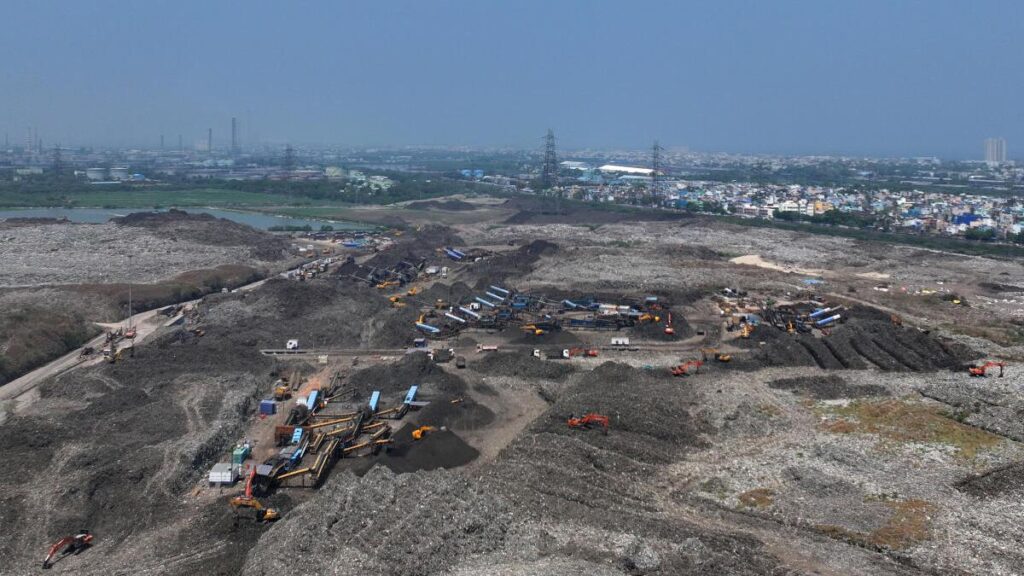After a delegation of Greater Chennai Corporation (GCC) engineers, led by Commissioner J. Kumaragurubaran, visited the Ivry-sur-Seine waste incinerator in Paris recently, the Corporation plans to proceed with its plans to set up a waste-to-energy (WTE) plant in Kodungaiyur.
“GCC is planning to go ahead with the project in Kodungaiyur. A government order is to be passed soon in the State Finance Department, which is partially funding the project. The file is under review currently,” said an official, who visited the plant.
The proposed plant in Kodungaiyur, estimated to cost ₹1,026.41 crore, would process 2,100 tonnes of waste daily and generate 31 mega watts of power.
Meanwhile, residents have got experts to point out the environmental and health hazards caused by the WTE plants in Hyderabad and Paris — both presented as models that would be followed by Chennai.
‘Flouting rules’
The Federation of North Chennai Residents Welfare Association (FNCRWA) and Chennai-based civil society organisations said the Hyderabad WTE facility operated by the Hyderabad MSW Energy Solutions (ReSustainability Ltd.) has been flouting the Solid Waste Management Rules, 2016.
Citing information from the Telangana Pollution Control Board (TGPCB), D.K. Chythenyen of the Centre for Financial Accountability (CFA) said the Hyderabad WTE plant had not conducted mandatory monitoring of hazardous pollutants — such as HCl, HF, CO, cadmium, thallium, mercury, dioxins and furans and total organic carbon — since its commissioning in 2020.
According to documents submitted by the TGPCB to the Central Pollution Control Board for onward submission to the National Green Tribunal (NGT), the Hyderabad plant was listed among 16 plants that did not conduct bottom ash or fly ash analysis and submit leachate analysis reports.
Moreover, it lacked full authorisation under the rules, placing it among the non-compliant WTE plants in the country.
However, no penalties have been imposed on it, although the same operator’s Delhi plant was reportedly fined ₹25 lakh for similar violations, a release from the federation said, citing the documents submitted to the NGT. The release also documented residents’ testimonies of health issues in areas surrounding the plant, including skin and respiratory diseases, infertility, and eye problems.

Communities as far as one kilometre from the plant reported foul odour. According to the residents, nearly 18 waterbodies, including the Gulla Pochamma Lake, were contaminated, and many families reported monthly medical expenses of up to ₹5,000 due to pollution-related illnesses, the release said.
Meanwhile, Paris-based environmental organisation ‘Collectif 3R’ has sent its detailed findings of the Ivry-sur-Seine plant to Chief Minister M.K. Stalin, GCC Commissioner, Chennai Mayor R. Priya, and the delegation of officials.about the dangers of WTE incineration.
In the letter dated May 6, the organisation claimed there were alarming levels of toxic contamination near the plant.
The letter, shared in a Facebook post, read: “…studies revealed widespread and dangerous levels of contamination in soil, water, vegetation, and even food such as farm eggs. France’s national health agency has already confirmed that backyard chicken eggs in the region are too polluted to consume, due to dioxins and PFAS. In Paris, soil and moss samples taken near schools and public spaces in Ivry-sur-Seine and in the surrounding towns showed dioxin levels above EU safety thresholds, sometimes ten times higher than the maximum limit recommended by the European Union for food consumption…”. Massive heavy metal pollution was observed in moss samples taken from four schools too with levels exceeding 100 times the maximum recommended thresholds for food consumption for aluminium, cobalt, lead and tin.
The organisation urged the Indian government to avoid Europe’s mistakes and pursue sustainable zero-waste alternatives instead.
“This [the plant in Paris] is not a model to emulate. The Paris incinerator being studied by Chennai officials is a proven polluter, and residents here must take note,” said social activist Nityanand Jayaraman in a message on a networking platform, citing the findings of a Dutch non-profit research group ‘Toxico Watch’.

According to this study published in April 2025, dioxins and heavy metals were found in moss, vegetation and soil samples taken from locations near the incinerator, including schoolyards and childcare centres, he said.
To these allegations, an official in the Solid Waste Management Department in the GCC said the studies would be reviewed.
Published – May 12, 2025 12:45 am IST
Source:https://www.thehindu.com/news/cities/chennai/not-a-model-to-emulate-greater-chennai-corporations-wte-plan-faces-more-pushback-residents-experts-cite-studies-revealing-pollution-in-paris-hyderabad-plants/article69561606.ece

